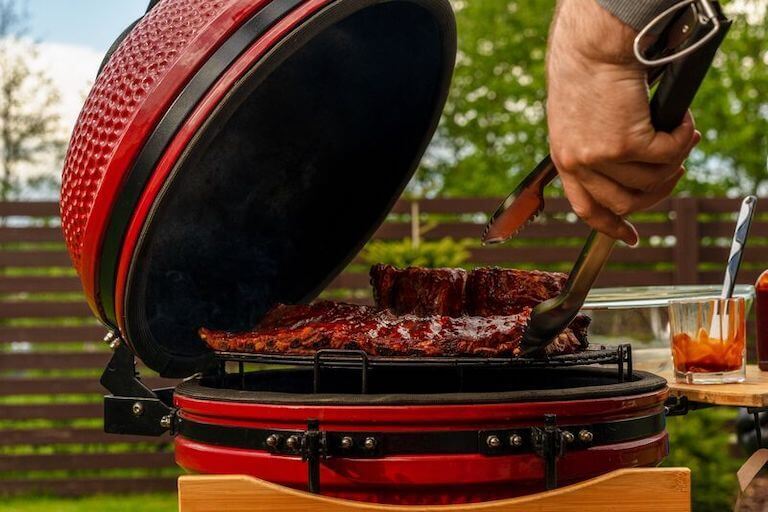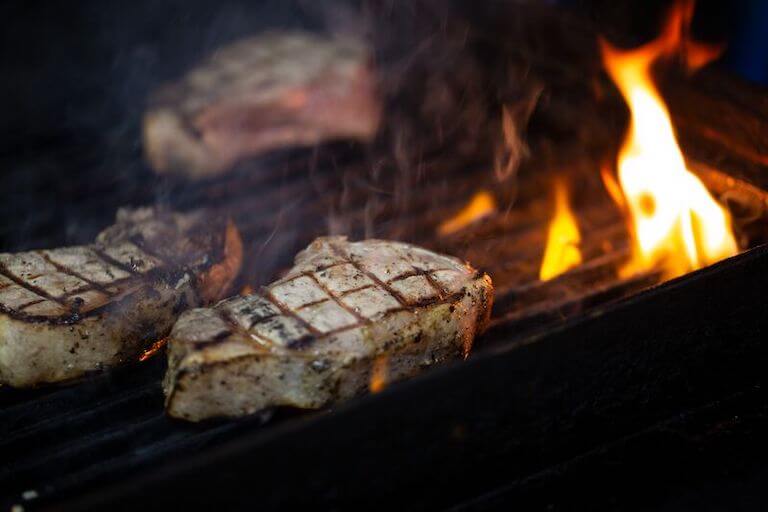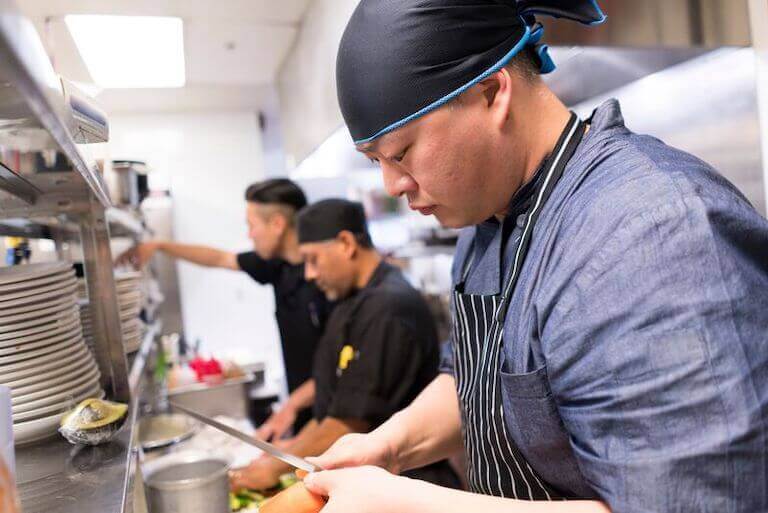Listen to This Article:
Ever wonder what it’s like to be an artist—more specifically, a barbeque artist? Enter the culinary coined term “pitmaster:” the craftsman of smoked meat.
Now when you think of a grill master, you might think of your father hovering over a state-of-the-art grill, scorching hot dogs on Labor Day. While your family might consider dad the pitmaster, another level of professional pitmasters actually exists. Usually you can find them in the major barbeque capitals of the world, including St. Louis, Kansas City, and more.
But how did these grill experts come to be? What skills and education might you need to become a true pitmaster? Let’s unpack this career and how to get started.
What Does a Pitmaster Do?
Let’s explore the exact Merriam-Webster dictionary definition of a pitmaster first, which is “a person who oversees the cooking done in a barbecue pit: a professional or skilled barbecuer.” To take that a step further, a pitmaster is someone who can confidently navigate any type of grill or smoker and truly understand how to assemble tender, well-seasoned BBQ fare–like steaks, ribs, seafood, and poultry.
In a way, pitmasters are so well-versed in barbeque skills, language, and craftsmanship that they rarely produce unappetizing results—they’ve commanded consistency. After all, they say it takes around 10,000 hours or so to discernibly conquer something. (Or in this instance, maybe grilling 10,000 ribeye steaks.)

Pitmaster grilling ribs outside.
A real pitmaster understands the ins and outs of culinary terms and exhibits a solid well-rounded foundation of cuisine knowledge. In turn, this allows smoke maestros to experiment with custom flavor profiles, push grilling boundaries, innovate, and ultimately, become a trailblazer within this very tight-knit community.
Take Louie Mueller, for example. He’s one of the most recognized barbeque gods of Texas and carried his pitmaster legacy down to his son Bobby, who won the James Beard Award for “America’s Classics” in 2006. The Mueller family is known for always producing quality barbecue while maintaining prolific flavors that you can’t replicate.
Key Pitmaster Job Responsibilities
- Although job responsibilities vary depending on the workplace, a pitmaster is usually expected to perform the following core duties/requirements:
- Maintain food preparation area, including all equipment and utensils
- Oversee standards for food production, handling, and safety
- Receive incoming merchandise and ensure it’s stored properly
- Operate a BBQ pit, understand standard recipes, and consistently execute
- Prep barbeque meals swiftly and efficiently
- Ensure food meets requirements for quality and quantity
- Ability to lift/carry up to 40lbs
- Flexible schedule and weekend availability
How to Become a Pitmaster
While there’s no concrete “ABC” path to becoming a expert of the grill, you can follow a plan to help support your career goals.
1. Enroll in Culinary School
The basic concept of barbecuing might seem easy to accomplish: fire up the grill, choose the right wood, utilize the right spices, and cook your meat to perfection. This is a whole lot easier said than done.
Do you understand how to best utilize each cut of meat and effectively control the cooking temperatures? How about what seasonings, sauces, and flavor profiles to use in order to yield the best results? And when it comes to pairing, what are the optimal garnishes and sides for the flavors you’re working with?
Students enrolled in culinary school diploma and degree programs at Escoffier can explore a well-balanced curriculum, covering a vast array of topics transferable across multiple cuisines. Studies may include topics like seasonings, knife skills, cooking methods, inventory management, menu design, food sanitation, and more.
“Graduating from Escoffier it gave me a better understanding of how to approach certain matters in the kitchen as well as helped me understand a little of the business portion of it.”*
Dannie White III, Escoffier Online Culinary Graduate
2. Seek Hands-On Experience
You can’t put a price tag on education. However, for those who dream about becoming a pitmaster, gaining hands-on training and shadowing an established griller might elevate your curriculum tenfold.
Why? Because the world of barbecue is so dynamic—filled with varying flavors and approaches. For instance, some pitmasters might prefer using a gritty dry rub while others choose to lather the meat in decadent, vinegar-forward sauces. Some might prefer specific sides to amplify a specific dish, like crunchy coleslaw or sweet cornbread. What about the level of doneness for the specific meat being grilled? Or tips to prevent under- or overcooking? These are the types of things aspiring pitmasters can glean from shadowing established chefs.
At Escoffier, this type of experience is built into the curriculum, as students complete an industry-focused externship to develop their skills and acumen, while potentially shadowing an experienced chef or grill expert. This hands-on opportunity might lead to entry-level job positions while expanding your network of barbecue experts!
“The externship class allows students–even those with no prior experience–to get their foot in the door. Once they gain that valuable experience, it is easier for them to determine which path they want to take with their careers.”*
Vicki Berger, Hospitality & Restaurant Operations Management Instructor
3. Practice Often and Find Your Barbecue Style
Ask any pitmaster and the resounding piece of advice is to practice, practice, practice. By putting in the hours and refining your barbecue skillset, you’ll eventually discover your favorite niche and signature style.
Of course, finding a barbecue niche comes with experience, but you can also begin to analyze how other regions in America barbecue, explore the different styles of sauces, and draw inspiration from multiple traditions. According to Thrillist, a few of these styles include:
- Alabama: Focuses just on the meat, and only using the sauce to improve natural, smoky flavors
- Memphis: The kings of slow-cooking pork and utilizing paprika-heavy dry rubs
- Kansas City: A land that embraces “all meat” and deep molasses sauces, resulting in rich caramelization

Grilling pork chops on a commercial grill.
4. Make Your Career Move
The truth is that there’s no official school, program, or certification that can earn you the title of pitmaster. It takes a matter of time, passion, and desire to keep refining your barbecue skillset. It’s up to you what the next move might look like.
For example, if you’re a Culinary Arts student at Escoffier, you can finish your degree program in 60 weeks, and then immediately start applying to pit positions.
Some restaurants will want to see experience before hiring a pitmaster, so you might start off as a barbecue line cook. A barbecue line cook focuses more on the prep work (cutting the meat, applying seasoning, maintaining smokers, etc.) rather than full execution. You can think of it as more of an assistant-type role—prepping you to eventually become a pitmaster yourself.

Line cook chopping in the back of the kitchen.
You might also consider opening your own barbecue joint—an opportunity to mark your own footprint within the barbecue industry.
Lastly, if you want to “make waves” within the barbecue community as a revered pitmaster, smoke wranglers often attend live competitions. This is a prime opportunity to showcase your distinct style and, if you win, earn a championship title.
Take Your Passion for Grilling to the Next Level
If you hold an unwavering passion for grilling and seek to become a skilled pitmaster, you can carve out your own path. All it takes is a desire to dive into the barbecue community and start your educational journey to understand those culinary fundamentals.
With diploma and degree programs available in Boulder, Austin, and online, Escoffier might have just the right option for you to start building foundational culinary skills that can help you embark on your pitmaster career.
Interested in exploring more careers in Culinary Arts? Read these next:
- What Does It Mean to Be a Professional Cook?
- How to Become a Chef: The Complete Guide
- 7 Tips for Becoming a Faster Cook
*Information may not reflect every student’s experience. Results and outcomes may be based on several factors, such as geographical region or previous experience.

 “The externship class allows students–even those with no prior experience–to get their foot in the door. Once they gain that valuable experience, it is easier for them to determine which path they want to take with their careers.”*
“The externship class allows students–even those with no prior experience–to get their foot in the door. Once they gain that valuable experience, it is easier for them to determine which path they want to take with their careers.”*